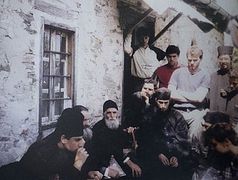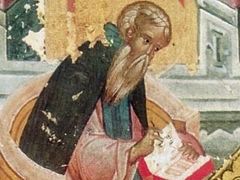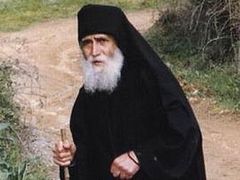In light of the recent commemoration of St. Isaac the Syrian the Bishop of Nineveh, we offer a small episode from the life of Elder Paisios, who particularly revered this saint and was very upset with the fact that modern-day theologians identified him as a follower of Nestorian heresy
One day, the Elder, sitting on a stone ledge near the monastery of Stavronikita, had a conversation with some pilgrims. One of them, a graduate of the school of theology, claimed that Abba Isaac the Syrian was a Nestorian, and he kept repeating his view that was so commonly accepted in the West.
The Elder Paisios tried to convince the theologian that Abba Isaac the Syrian was not only Orthodox, but also a saint, and his ascetic words were filled with great grace and power. But the elder’s attempts turned out to be futile—the “theologian” stubbornly stood his ground. The elder retreated to his cell in distress and immersed himself in prayer.
 St. Isaac the Syrian When he had walked just a little distance from the monastery and reached a large sycamore tree, in his own words, he “experienced an event”, which he declined to describe in greater detail. According to one testimony, the elder had a vision: he saw the venerable monastic fathers passing in front of him. One of the venerable saints stopped in front of the Elder and said, “I am Isaac the Syrian. I am really and truly Orthodox. Indeed, the area where I served as bishop fell into the Nestorian heresy, but I fought against it.” We are unable to confirm the truthfulness of this vision or to reject it. At any rate, beyond a doubt, the event the Elder had witnessed was of supernatural origin. This event clearly and precisely informed the Elder of the Orthodoxy and holiness of Abba Isaac.
St. Isaac the Syrian When he had walked just a little distance from the monastery and reached a large sycamore tree, in his own words, he “experienced an event”, which he declined to describe in greater detail. According to one testimony, the elder had a vision: he saw the venerable monastic fathers passing in front of him. One of the venerable saints stopped in front of the Elder and said, “I am Isaac the Syrian. I am really and truly Orthodox. Indeed, the area where I served as bishop fell into the Nestorian heresy, but I fought against it.” We are unable to confirm the truthfulness of this vision or to reject it. At any rate, beyond a doubt, the event the Elder had witnessed was of supernatural origin. This event clearly and precisely informed the Elder of the Orthodoxy and holiness of Abba Isaac.
The book by St. Isaac lay at the head of the Elder’s bed. He would read this book all the time, and for six years, it would be his only spiritual reading. He used to read a single phrase from the book only to repeat it in his mind throughout the day, “working” at it actively and in depth, in his own words, just like “the cattle that chews their cud.” The Elder would hand out excerpts from St. Isaac’s writing as a blessing to his visitors in his desire to encourage people to read his works. The Elder believed that the study of the ascetic writings by Abba Isaac is “greatly beneficial since it allows us to grasp the most profound meaning of life. And if a person who believes in God, has complexes of any kind, either large or small, it will help him be rid of them. Abba Isaac’s book contains a great number of spiritual ‘vitamins’, and owing to them, it transforms the soul.”1
The elder also advised the laity to read Abba Isaac, but in small bites in order to digest what they have just read. The elder said that Abba Isaac’s book is identical in value to the entire library of the Holy Fathers.
Elder Paisios wrote in his book by Abba Isaac under the icon of the saint that shows him holding a pen: “Abba, give me your pen so that I can underline every single word in your book!” With this, the elder meant to say that this book is of such great value that every word in it is worth underlining.
The Elder not only read the sayings of Abba Isaac, but he also held him in great awe and revered him as a saint. The icon of St. Isaac the Syrian was one of the very few icons placed on the tiny altar table in his Panaguda cell. Because of his love and reverence for the saint, the Elder gave his name to one of the monks when he tonsured him into the Great Schema. The Elder celebrated the memory of St. Isaac on September 28. He saw to it that all the fathers from his inner circle celebrated a general All-Night Vigil on this day. During one of these vigils, the Elder was seen surrounded by the Light of Tabor, exalted and in a transformed state.
 Page from the Menaion autographed by Elder Paisios: “The 28th day of this same month is the commemoration day of our Venerable Father Ephraim the Syrian and Isaac the Great Hesychast, who were treated so unfairly.”
Page from the Menaion autographed by Elder Paisios: “The 28th day of this same month is the commemoration day of our Venerable Father Ephraim the Syrian and Isaac the Great Hesychast, who were treated so unfairly.”
Before the Fathers began to commemorate the memory of the saint on September 28, the Elder had signed the following in his Menaion on January 28 (on this day the memory of St. Isaac the Syrian is commemorated, together with that of St. Ephraim the Syrian): “The 28th day of this month is the commemoration day of our Venerable Father Ephraim the Syrian, as well as Isaac the Great Hesychast, who were treated so unfairly.”
From: Hieromonk Isaac. Life of the Elder Paisios of the Holy Mountain (Moscow: Holy Mountain, 2006), 243–245.





